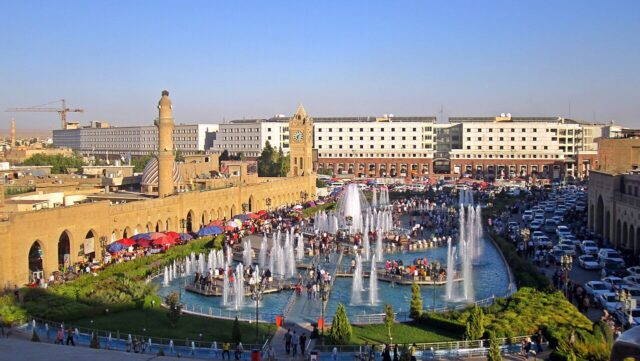Kurdistan Tourism Sector Analysis

Geopolitical Report ISSN 2785-2598 Volume 41 Issue 20
SpecialEurasia OSINT Team
Executive Summary
The Kurdistan Region has recently witnessed a significant surge in tourism, with over 1.5 million visitors arriving in the past three months. Ambitious plans unveiled by the Kurdistan Tourism Board aim to attract 20 million tourists annually by 2030, aligning with the government’s economic diversification agenda.
However, political fragmentation, regional tensions, and internal disputes create a complex geopolitical landscape that contrasts the region’s tourism potential.
Despite these challenges, the Kurdistan Region’s unique blend of cultural heritage and natural beauty positions it as a promising tourism destination.
Mitigating risks, fostering regional dialogue, and enhancing infrastructure are crucial for realising the region’s tourism aspirations and ensuring sustainable growth.
Background Information
The Kurdistan Region boasts a rich tapestry of historical and cultural attractions, including the 6,000-year-old Erbil Citadel, UNESCO World Heritage Site, and diverse culinary experiences. Recent statistics show the region has experienced a remarkable surge in tourism, with over 1.5 million visitors arriving in the past three months alone.
Ibrahim Abdulmajid, the spokesperson for the Iraqi Kurdistan Tourism Board, highlighted the region’s growing appeal, attributing it to its diverse attractions and year-round accessibility. The head of the Kurdistan Regional Tourism Committee Amal Jalal unveiled the ambitious project aimed to further bolster the sector, with a target of attracting 20 million tourists annually by 2030.
Kurdistan, with its rich cultural heritage, archaeological sites, and breathtaking landscapes, might become a leading tourism destination, aligning with the government’s economic diversification agenda.
Kurdistan: A Geopolitical Scenario
The geopolitical dynamics within Iraqi Kurdistan represent a multifaceted interplay of regional power struggles, energy interests, and internal political fractures. Of particular significance are the enduring rifts between the Kurdistan Democratic Party (KDP) and the Patriotic Union of Kurdistan (PUK), which have not only perpetuated internal instability, but also hindered cohesive governance structures.
Amidst these challenges, the region’s substantial gas reserves stand as a potential game-changer in the broader Middle Eastern geopolitical landscape. However, the region’s internal discord and strained relationship with the central government in Baghdad hinder the realisation of its potential. Historical reliance on Baghdad for energy sector oversight has constrained Erbil’s autonomy despite its strategic significance in regional energy dynamics.
Constructive regional dialogue is imperative for effectively navigating the complexities surrounding Kurdish energy exports. Fostering partnerships with Gulf states and Western powers could mitigate opposition from Iran and unlock opportunities for enhanced energy cooperation.
The geopolitical ramifications of internal turmoil within Kurdistan extend beyond energy dynamics, potentially exacerbating instability within Iraq and the wider Middle East, thereby warranting careful consideration and strategic planning.
Risk Assessment
While the Kurdistan Region presents immense potential for tourism development, several risks warrant consideration. Political instability within Iraq, coupled with regional tensions and local terrorist groups, could disrupt the sector’s growth trajectory. Security concerns and infrastructure deficiencies may hinder the region’s ability to realize its tourism goals.
Scenarios Analysis
- Optimistic Scenario. Erbil successfully implements its tourism development plans, attracting increasing numbers of domestic and international visitors. Political stability and effective marketing initiatives propel the sector towards achieving its ambitious targets, fostering economic growth and diversification.
- Moderate Scenario. Despite facing occasional challenges, such as sporadic security incidents or economic fluctuations, the Kurdistan tourism sector maintains a steady growth trajectory. Pragmatic policies and adaptive strategies enable the region to navigate uncertainties, albeit at a slightly slower pace than expected.
- Pessimistic Scenario. Escalating regional tensions or prolonged political instability undermines the regional tourism aspirations. Visitor numbers stagnate or decline, investment confidence wanes, and the sector struggles to recover, posing significant setbacks to economic development and stability.
Conclusion/Recommendations
Kurdistan’s tourism sector holds immense promise for economic growth and diversification. To capitalise on this potential, stakeholders must prioritise efforts to enhance security, improve infrastructure, and streamline regulatory processes. Collaborative partnerships between government agencies, private investors, and international stakeholders are essential to realising the region’s tourism ambitions.
It is imperative to develop risk management strategies and contingency plans to mitigate potential threats and guarantee the sector’s resilience in the face of challenges. By fostering a conducive environment for tourism development, the Kurdistan Region can emerge as a premier destination on the global stage, offering unparalleled experiences to visitors from around the world.
Read also | SWOT Analysis: Contemporary Iraq Between Economic Opportunities and Security Challenges |
If you need more information, reports, and risk assessments on Kurdistan and Iraq, reach out to us at info@specialeurasia.com.
